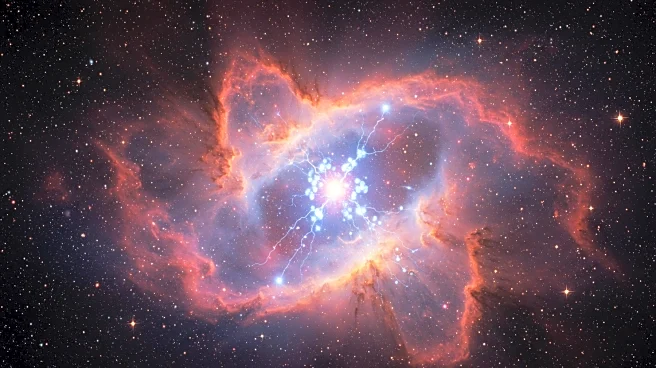What's Happening?
In February 2023, a cosmic particle detector located in the Mediterranean Sea recorded a neutrino with unprecedented energy levels, approximately 220 petaelectronvolts (PeV). This neutrino, named KM3-230213A, exhibited energy levels 20 to 30 times higher than any previously documented neutrino. Neutrinos are fundamental particles that rarely interact with other matter, often passing through without alteration. The detection of KM3-230213A has sparked significant interest among physicists, as it could either indicate a new cosmic process or be a measurement error. A recent study published in Physical Review X has confirmed the neutrino's authenticity, ruling out statistical illusion as an explanation.
Why It's Important?
The confirmation of KM3-230213A's detection is significant for the field of particle physics, as it may suggest the existence of previously unseen cosmic phenomena. Neutrinos, often referred to as 'ghost particles,' can provide insights into distant cosmic events due to their ability to travel through the universe without deflection or absorption. The ultra-high energy of this neutrino suggests it could have originated from powerful cosmic accelerators such as gamma-ray bursts, supernovae, or relativistic jets near black holes. Understanding these origins could advance scientific knowledge of cosmic processes and contribute to the broader understanding of the universe.
What's Next?
Researchers are likely to continue investigating the origins of KM3-230213A and search for other neutrinos with similar energy levels. If more ultra-energetic neutrinos are detected, it could indicate the presence of new astrophysical sources or cosmogenic neutrinos produced by cosmic rays interacting with the cosmic microwave background. These findings could lead to new theories and models in astrophysics, potentially reshaping current understanding of cosmic phenomena.
Beyond the Headlines
The detection of KM3-230213A highlights the importance of neutrinos in astrophysical research. As 'reporters from the universe,' neutrinos can offer unique insights into cosmic events that are otherwise inaccessible. This discovery may prompt further exploration into the role of neutrinos in understanding the universe's fundamental processes, potentially influencing future research directions in particle physics and cosmology.









